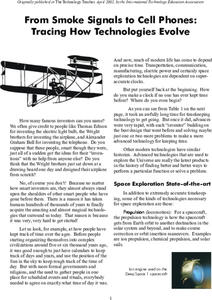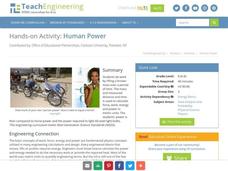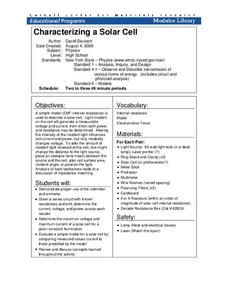Bonneville
Phone Charger Efficiency
Be efficient in learning about efficiency. A fun hands-on activity has pupils calculate the efficiency of cell phone chargers by measuring the power in and power out. They also learn how to read and use circuit diagrams.
Bonneville
Activities and Assessment of Vocabulary and Units
It's pass or fail, and one must pass to move on to the next lesson—no pressure. The second of seven installments in the Off the Grid unit has pupils demonstrate their knowledge of vocabulary as well as the process of using a multimeter....
Bonneville
Electrical Energy and Solar Module Efficiency
It's much more efficient if everyone knows the relevant terms. Pupils research vocabulary terms related to electric currents to start a unit on solar energy. They then use a multimeter to measure the voltage and current for a solar...
Bonneville
Variables Affecting Wind Turbine Power
Design the best from the best. Groups work together to come up with the best configuration of different variables that affect a wind turbine. The teams choose from several variables such as the number of blades, the angle of the blades,...
Bonneville
How Much Energy Do YOU Use?
Determine the power hog in the house. Pupils learn the difference between power and energy before participating in a hands-on activity. Using a power meter, pairs measure the actual power used for several household devices, estimate the...
NASA
From Smoke Signals to Cell Phones: Tracing How Technologies Evolve
Explore the science of space exploration. Pupils consider technological advances in propulsion, communication, power, navigation, and imaging. They select one of these areas and create a timeline of historical progress that contributed...
NASA
Moon Power - Energy and Power
Be over the moon about finding a resource on lunar power stations. An interesting unit composed of 10 lessons has pupils first learn about the energy and power needs of a futuristic lunar colony. They design and build a lunar power...
Teach Engineering
Powering a Device Using Food
Eat up a resource on using food to power electrical devices. Future engineers first experiment with different fruits and vegetables to determine the amount of electrical energy they provide. Based on the data, they design and create an...
Western Justice Center
Power
A short video asks viewers to think about power in new ways. The narrator suggests that there are different types of power, 10 different sources of power. After watching the video, class members study a series of scenarios and identify...
Science Friday
Wind Power
Blow away the competition with a lesson about wind power and turbines. Groups build windmills to test how the size of blades affect the amount of work done. The scholars build a variety of blades and collect data on how each type...
College Board
2000 AP® Environmental Science Free-Response Questions
Practice makes perfect! A released AP® exam gives scholars practice with the high level of expectations of their exams. The exam consists of four questions from 2000. Questions ask about endangered species, recycling, alternative fuels,...
College Board
2006 AP® Environmental Science Free-Response Questions
There is a strong correlation between the carbon dioxide concentration in the air temperature. Scholars offer explanations for the correlation in one of four AP® free-response assessment questions. Their analyses in the other questions...
College Board
2017 AP® World History Free-Response Questions
Religion and politics have a complicated history. How were they intertwined with wealth in Europe and Asia in the Middle Ages? Learners explore the question using a prompt based on primary sources. Other activities allow individuals to...
College Board
2014 AP® Psychology Free-Response Questions
A college undergrad has a lackluster first year. Why? A structured prompt from the College Board asks learners to explore various psychological dynamics and how they can affect a young man's freshman experience. A second question asks...
Mathed Up!
Algebra: Indices
Indices and exponents mean the same. Pupils review exponential notation by watching the review video for the General Certificate of Secondary Education math assessment refresher. Scholars then use the activity to show what they know...
College Board
2015 AP® Human Geography Free-Response Questions
How are population and political power related? What is the significance of the globalization of English? Why do refugees leave their home countries? Using structured short-answer questions, scholars unravel complicated dynamics with...
SOAR
Multicultural Youth Leadership
Teens of the world, unite! Take your class or club on a multicultural journey through the relationship between cultural values and teen leadership skills. Groups work together to learn about one another's cultures while examining the...
Facing History and Ourselves
The Nazis in Power: Propaganda and Conformity
The Nazis used the power of propaganda to encourage confirmative views and the discrimination of Jews. A social studies resource illustrates these issues through discussion, image analysis, and a writing exercise.
US Institute of Peace
Perspectives on Peace
Is peace simply the absence of war, or is there more to the story? Young social scientists define peace in the second installment of a 15-part series. Groups work together to explore cultural concepts of peace and the peacemaking process...
Teach Engineering
Human Power
How many humans does it take to power a light bulb? The 10th part of a 25-lesson Energy Systems and Solutions unit has learners conduct an experiment to calculate power. They then use the results to determine how many classmates they...
Teach Engineering
Energy Basics
Power up your lessons with an energetic resource. Scholars learn about work, force, energy, and power. They consider the relationships between these quantities through hockey puck scenarios and make calculations using formulas.
Cornell University
Characterizing a Solar Cell
Young classes are sure to get a charge out of this lesson! Learners experiment with circuits of a solar cell. They practice determining current, voltage, and power for the circuit and maximize the voltage and current of the cell.
CK-12 Foundation
DeMoivre's Theorem and nth Roots: The nth Roots of Unity
The nth roots of unity all have a magnitude of one. Scholars use the unit circle and DeMoivre's Theorem to find the complex roots of one and discover that the complex numbers all lie on the unit circle and are equally spaced around it...
Florida International University
Designing an Autonomous Underwater Vehicle (AUV): Concepts in Lift, Drag, Thrust, Energy, Power, Mass, and Buoyancy
Engineer an autonomous underwater vehicle (AUV) to study concepts of physics. Using household materials, collaborative groups design and build an AUV and then test Newton's Laws of Motion as they apply them in underwater environments...

























